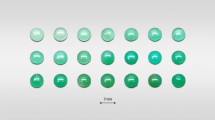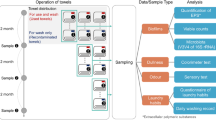Abstract
STAINING of the fleece by bacterial pigments has been described1, and a number of colours have been attributed to a variety of organisms. Recent investigations on the staining of Corriedale fleeces during periods of wet weather have shown that several stains similar to some of those described in previous work can be caused by the oxidation or reduction products of the pigment pyocyanine, produced by a single species Pseudomonas aeruginosa (Schroeter) Migula.
This is a preview of subscription content, access via your institution
Access options
Subscribe to this journal
Receive 51 print issues and online access
$199.00 per year
only $3.90 per issue
Buy this article
- Purchase on Springer Link
- Instant access to full article PDF
Prices may be subject to local taxes which are calculated during checkout
Similar content being viewed by others
References
Seddon, H. R., Sci. Bull. Dep. Agric. N.S.W., No. 54 (1937). Belschner, H. G., Sci. Bull. Dep. Agric. N.S.W., No. 54 (1937).
Fraser, I. E. B. (in the press).
Friedheim, E., and Michaelis, L., J. Biol. Chem., 91, 355 (1935).
Speakman, J. B., and McMahon, P. R., J. Sci. Tech. N.Z., 20, 248B (1941).
Author information
Authors and Affiliations
Rights and permissions
About this article
Cite this article
FRASER, I., MULCOCK, A. Staining of Wool by Bacterial Pigments. Nature 177, 628–629 (1956). https://doi.org/10.1038/177628a0
Issue Date:
DOI: https://doi.org/10.1038/177628a0
Comments
By submitting a comment you agree to abide by our Terms and Community Guidelines. If you find something abusive or that does not comply with our terms or guidelines please flag it as inappropriate.



